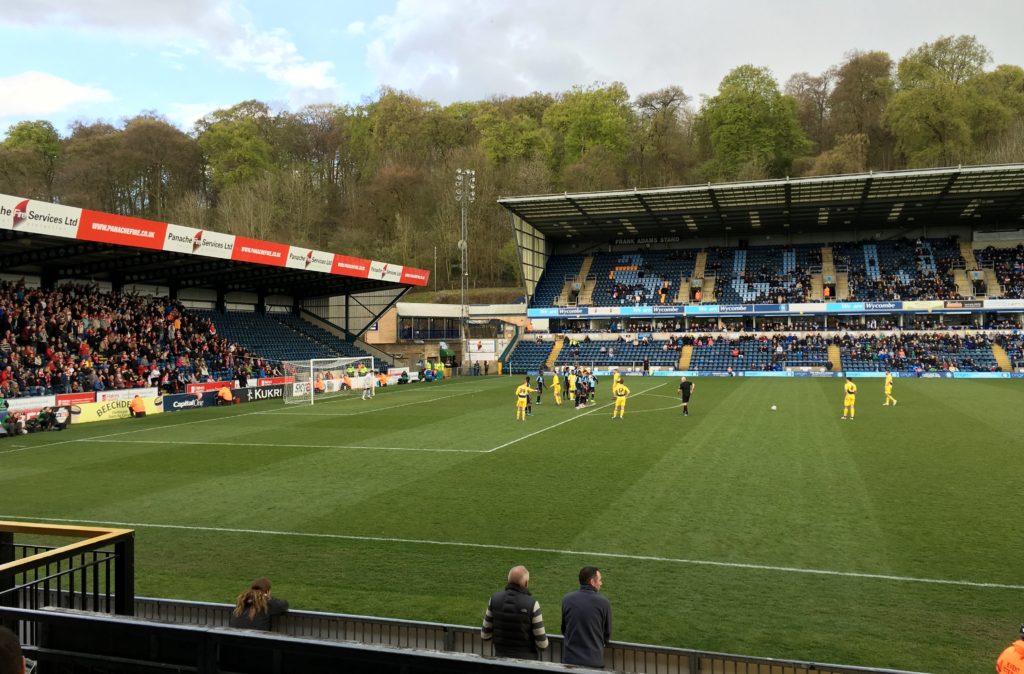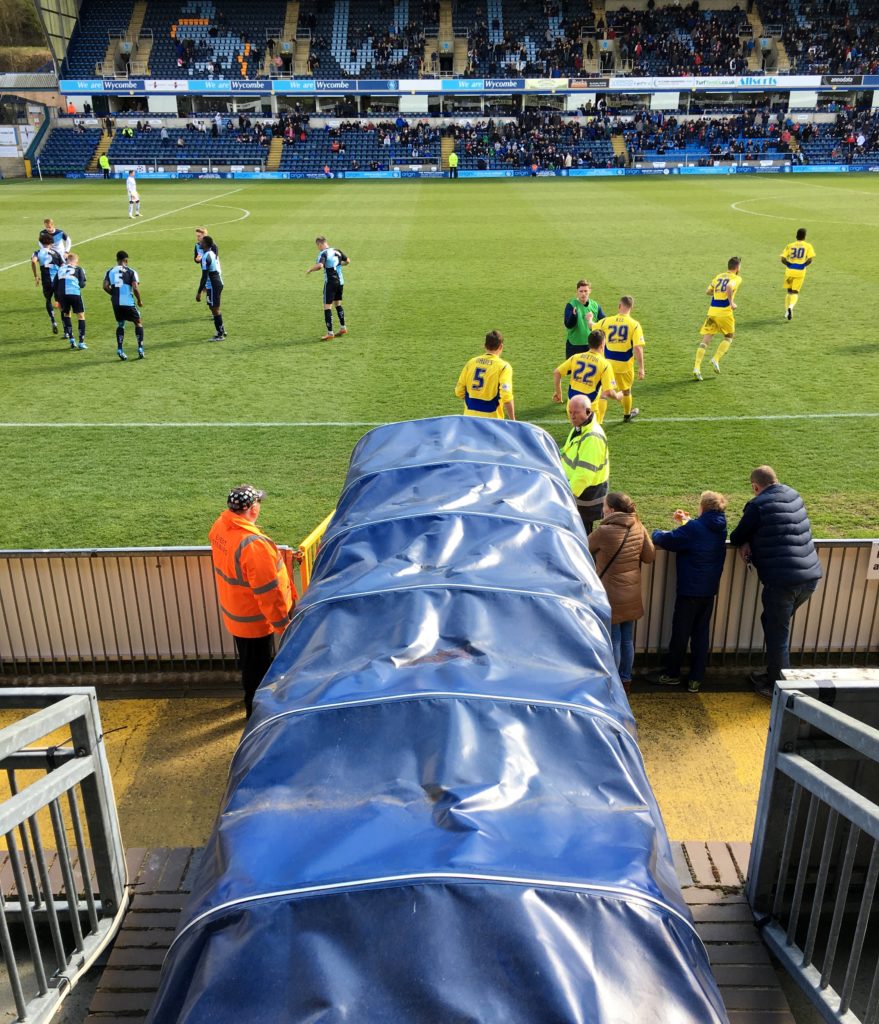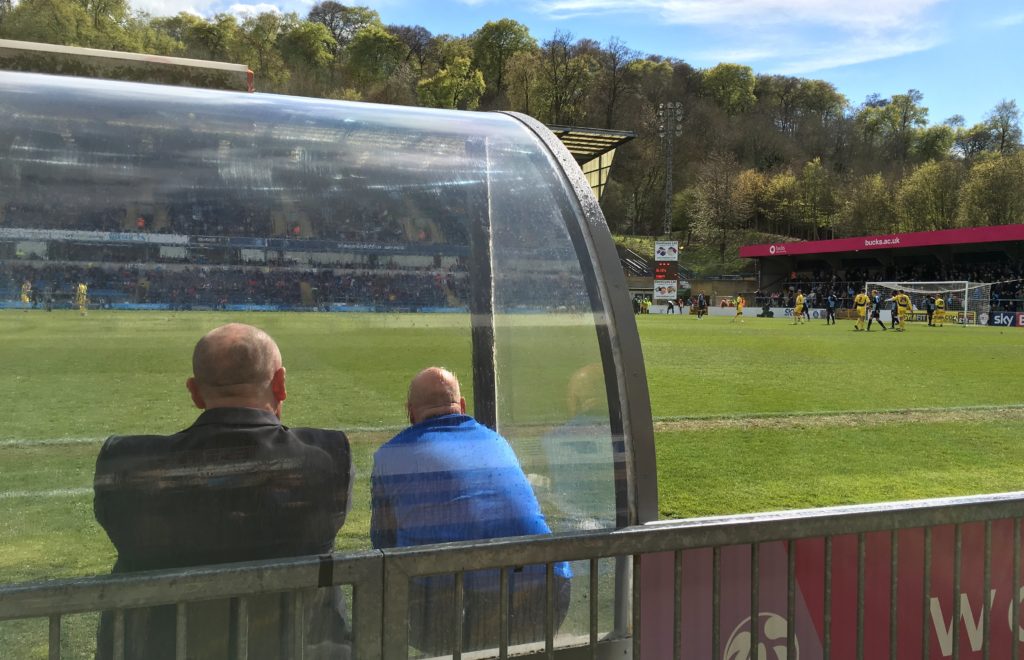Josh Windass places the ball on the grass and looks up. He’s around 30 yards from goal. The wind drops as Wycombe’s debutant goalkeeper Benji Siegrist hurriedly arranges the wall. He’s going to hit it.
Scrolling through his photos of the first-half action, the Football League snapper stops on a stunning shot of a bird of prey with its wings outstretched. “What is it?” he asks the press room, a question aimed at no one in particular and without much hope of a definitive answer. To his surprise, a photographer from Accrington Stanley responds. “That’s a red kite.” The two men gaze at the magnificent bird trapped in the three-inch screen. The mind wanders to a phoenix rising from the ashes.
Accrington are the club that wouldn’t die, a motto that greets the team as they enter the pitch at their home the Crown Ground, or Wham Stadium as it’s also known. Sadly, the name doesn’t derive from the pop duo or confectionary bar. When the £200,000 three-year sponsorship deal was agreed with local business What More UK last August, Stanley manager John Coleman said: “It’s been long documented where we are. We are the poorest club in the league but you wouldn’t say that when you see us on the pitch. We will shock a lot of people next year.” Nine months on, he has proved a man of his word.
The story of Accrington is one of death, rebirth and an enduring battle to survive. A history spent living on the margins. The original club resigned from the Fourth Division in 1962, strangled by rising debts and the greater appeal of local rivals Blackburn Rovers and Burnley. Four years later they folded.
It was to be a temporary closure. In 1968, the club’s current incarnation was formed, born to wander the non-league wilderness, and feature in television milk adverts, for nearly four decades before an unlikely promotion from the Conference in 2006. In a twist of fate, Accrington leapfrogged Oxford United, the club elected by the League to replace them in 1962, as they made their long-awaited return. No longer ships in the night, it is Oxford they are vying against as the battle to follow Northampton Town into League One goes to the final day.
Windass has counted his steps. At Ibrox, 50,000 will be waiting with bated breath. Today it’s the several hundred Accrington fans who have made the long journey south on coaches subsidised by new owner Andy Holt. The referee blows his whistle.

Resurrection has not signalled redemption. With more than twice the population of Accrington, wealthier owners and relative success, both historical and recent, Blackburn and Burnley still hoover up most of East Lancashire’s football fans. Between the crumbling cotton mills and tightly packed terraced houses, built by the famous Nori bricks – the hardest and densest building bricks in the world which were once manufactured locally and exported to New York to be used in the construction of the Empire State Building – Stanley remain asphyxiated, the club of eccentrics and die-hards.
Former chairman Eric Whalley was both, a much-loved custodian responsible for bringing John Coleman to Stanley for his first spell in 1999 and overseeing promotion back to the Football League. Whalley, who passed away in 2014, is widely recognised as the club’s saviour. Accrington have needed plenty of them over the years.
In 2009, a winding-up order was issued by HMRC over unpaid debts before non-executive chairman Ilyas Khan and club president Peter Marsden put their hands in their pockets to settle the shortfall. In 2013, during former England international James Beattie’s reign as manager, Stanley failed to pay the players until the board came to the rescue again to make up costs. “It’s tremendously difficult trying to keep a League Two football club going,” explained former managing director Rob Heys. “We have got the lowest gates and the smallest wage budget and it is a battle to stay in League Two, but it’s where we want to be. We accept that battle because if we wanted an easy life we’d drop down a couple of levels. Everyone who works here goes over and above what they’ve been asked to do.”
The fine margins in Stanley’s accounts remain. After Saturday’s trip to Wycombe, a club official could be seen insisting with no little urgency to a Domino’s pizza delivery driver – the provider of the team’s post-match reward – that he must have a receipt for his enormous order. But where problems persist, community spirit perseveres. The supporters and staff have dragged this club through its entire existence.
Outside the ground a fan describes how those involved in the club go above and beyond: “When Asa Hartford was here a little while ago, he was reserve team manager and chief scout. Mick Short was the kit man and security officer. James Beattie, when he was manager, used to sit in his office and invite supporters in for a chat. He’d then go and clean out the toilets. It’s that sort of club, everybody does other jobs to keep it going. Andy Holt, the owner, was chopping trees down the other day behind one of the goals.”
Adams Park is a serene setting for a football match. A high bank of trees rises above the main stand as two more red kites soar past. Fans casually walk about the concourse behind the team benches, chatting to the substitutes during their warm-up routines. Windass begins his run-up.
“Nobody is coming to play for Accrington for the money or for the glory of playing for the club – they’re here because they’re hungry and because they’re honest,” Coleman said recently in an interview with Sky Sports. “It really all boils down to enthusiasm. Our training facilities are awful, so we can’t attract players that way either. We have one council Astroturf pitch which we use for all of our training – and that’s if the Football in the Community people don’t need it.”
In 2010, Fulham travelled to the Crown Ground, which borrows its name from the Stanley-owned local pub, for an FA Cup fourth-round tie. After arriving at the stadium, Roy Hodgson cast a horrified eye over the archaic, rickety dressing rooms before promptly taking his squad back to the hotel to get changed. “I don’t think we adapted very well to the conditions in the beginning of the game,” he said after an unconvincing 3-1 win.
The state of the dressing rooms has been addressed in a fundraising campaign led by former England cricketer and Accrington fan David Lloyd. Thousands have been pledged towards the £25,000 target, but in October the brakes were put on when Andy Holt, owner of stadium sponsor Wham, bought the club. “Whatever individual, company or other entity owns the club is largely irrelevant, because this isn’t a business venture,” he said at the announcement. “Has anyone ever made a profit out of Accrington Stanley? In 50 years I will be dust blowing in the wind. Hopefully our input will mean the club is not.”

Holt, who the Independent referred to as ‘Accrington Stanley’s Abramovich’, clearly has the club in his heart. “It was needs must,” he told the newspaper of his rescue bid. “My first game was a friendly against Burnley and we were 3-0 up in no time. It was fantastic. But the club ran out of beer that day. They hadn’t paid the bills. It soon became evident the club wasn’t paying players, staff, suppliers. They needed more support or they were finished.”
Windass strikes the ball sweetly, curling it over the wall and towards the bottom right-hand corner of the goal. The crowd are pulled to their feet; the Accrington players anticipate the second ball.
Holt’s takeover came too late to tie Stanley’s star duo, Josh Windass and Matt Crooks, to longer deals before they were poached on pre-contract agreements by Glasgow Rangers. It is a tough life at the bottom. While nobody at the club begrudges the players their headline moves, Coleman was briefly irked in January: “I don’t get embroiled in social media but I do think going on and seeing the players had tweeted about ‘buzzing to play for a massive club’ is disrespectful to our fans.”
Frustrations were put to one side for the greater good as Holt’s investment allowed Stanley to strengthen mid-season for the first time. Released Stevenage defender Mark Hughes was snapped up on a free transfer, as were Grimsby’s Scott Brown and Portsmouth’s Romuald Boco – back for a third spell at the Crown Ground. In March, 20-year-old Reading winger Tarique Fosu-Henry joined the squad on loan until the end of the season. He has scored three times in seven appearances, including a crucial winner away to Hartlepool on April 19th that took Accrington into the automatic promotion places.
This process of carefully gluing together a squad of misfits whose luck had largely run out elsewhere, relishing the underdog tag and defying the odds to be masters of their own fate, is reminiscent of Leicester City’s miracle run to the Premier League title. “We’re Leicester under the radar,” said one fan outside Adams Park. Coleman would go one further. “They’ve won a title no one expected them to, but it was still feasible,” he told the BBC. “We are possibly going to get promotion when it is not feasible. It’s the equivalent of finishing second in a Formula One race on a bike.”

At the start of the season, Stanley were 33/1 to go up. Although not quite a 5000/1 shot, compared to the other two remaining teams in with a shout this weekend – Oxford (7/4) and Bristol Rovers (6/1) – it’s obvious who the outsiders were. Even York City, relegated by a 3-0 defeat to Accrington two weeks ago, were priced as short as 6/1 in August to be sitting at the top end of the table in May.
But this isn’t a typical lower-league tale of grit and determination, long balls, long throws and playing the percentages. Stanley can pass it about a bit, a fact widely acknowledged by the rest of the division and illustrated by goalkeeper Ross Etheridge rolling the ball out at every opportunity so the team can build from the back. ‘Often unfairly tarred with a stereotype of being a physical, long-ball outfit, Accrington have built their success this season on an entertaining football approach with a combination of technical, often diminutive players passing their way into the top three,’ remarked the Wycombe programme. ‘They’ve kept faith with this style of play even during the winter months on difficult pitches, with two players hitting double figures, including the talismanic Josh Windass who has reached a high profile due to his attacking talents.’
Thwack. Siegrist gets a hand to it and the ball thumps into the post with a satisfying thud that can be heard all around Adams Park. The Wycombe supporter sitting in front, wireless radio in hand and wearing a heavily pin-badged cap, raises his arms in celebration. But the ball is still alive.
As with all promotion pushes, there is a defining moment when it suddenly seemed possible. For long-serving Accrington fan Tony Bartlett, this came in the 313-mile away trip to Plymouth Argyle back in October. Stanley lost 1-0 to a team that were setting the pace in League Two at the time, but Tony spotted something: “Plymouth were top by four points, but we completely played them off the park even though we lost 1-0. Their goalkeeper had a blinder that day and the Plymouth fans said after that we deserved to win. It was then I started to think we could go up.”

There isn’t much time for patience in the cut and thrust of a League Two promotion race, but Coleman imbues his team with calmness from the touchline. It took a fourth strong shout for a penalty against Wycombe for the manager to finally rise from the bench for a quiet word with the fourth official, while victory was celebrated with little more than a satisfied fist-pump. After a two-year hiatus at Rochdale, Southport and Sligo Rovers, Coleman is back where he belongs, searching for his fourth Stanley promotion. “Johnny Coleman, football genius,” chanted the travelling fans. “Some managers and clubs just fit,” said one after the game.
While Coleman and his backroom staff calmly surveyed the action from the sideline, tensions on the pitch edged towards boiling point in the second half. Windass, aggrieved at being denied a penalty after his slaloming run into the box was ended abruptly, shared a few choice words with the referee and then the Wycombe bench, who had their own view of the incident. Stanley’s prowling assistant Jimmy Bell prodded his head repeatedly, in a manner that didn’t effectively convey the message to cool it.
Windass is very much his father’s son. A natural, instinctive footballer, his broad shoulders mirror Dean both in physique and the strength to take responsibility when necessary. Windass senior led hometown club Hull in to the Premier League in 2008, scoring a brilliant winning goal in the play-off final against Bristol City, and junior is visibly focused on earning his own taste of promotion at Stanley. The dust soon settled on his agreement with Rangers and, with 16 goals to his name, his commitment to the cause has been undeniable.
Siegrist is lying helpless on the grass. He turns to see two Accrington players rushing in. One is Mark Hughes. It’s fair to say the defender’s distribution has been a little iffy so far; moments earlier a free-kick on the halfway line was punted into touch. But he’s calm when it matters, side-footing the ball home. 1-0. 12 minutes to play.
“Ask (Stanley first-team coach) Mike Newell who I had called to score a goal in the car going to the coach,” Coleman told reporters afterwards. “I said Mark Hughes always gets a goal every season and he hasn’t got one this season. He was due one and thankfully he has popped up with it.” There was praise too for Hughes’ centre-back partner Adam Buxton – “he was like a vintage Larry Lloyd or John Terry in the air” – and of course the brilliant travelling support: “The reception we got when we arrived at the ground brought a tear to my eye.”
But it wasn’t long until attention turned to the final game. With Oxford and Bristol Rovers both winning, Accrington’s champagne was left on ice. At least the grip on second place hadn’t loosened. It remains in their own hands and, at Stanley, that isn’t something they get to say often. A win against Stevenage on Saturday and results elsewhere don’t matter. “We can smell it now,” said winger Piero Mingoia.
The closest Accrington have come in the past to reaching League One was, by coincidence, a play-off semi-final against Stevenage in 2011. They lost both legs. This time Stevenage are 19th, although their league position belies a run of just one defeat in eight matches. It is a sell-out at the Crown Ground and Stanley’s job is clear: whatever happens between Bristol Rovers and relegated Dagenham, whatever happens in Oxford’s derby at home to Wycombe, win, and they are a League One club. Bolton and Sheffield United at the 5,057 capacity Wham Stadium. The bicycle finishing second in the Formula One race. “It will be nerves because we are at home,” said Coleman. “But it’s in our hands, we have got 84 points and that in itself is a remarkable achievement. Now we just have to finish it off.”
The ref blows the final whistle. The supporter in the Wycombe cap has already left, taking his wireless with him. The Accrington bench run on to the pitch, Coleman shakes his fist in jubilation. The Sky Sports News team are here, ready for a live broadcast. The Football League promotion banners are rolled away for another week. It wasn’t done today but this is still the story. One more game.
Massive goal for @ASFCofficial pic.twitter.com/8Uz28oguRl
— Matthew Stanger (@MatthewStanger) April 30, 2016






